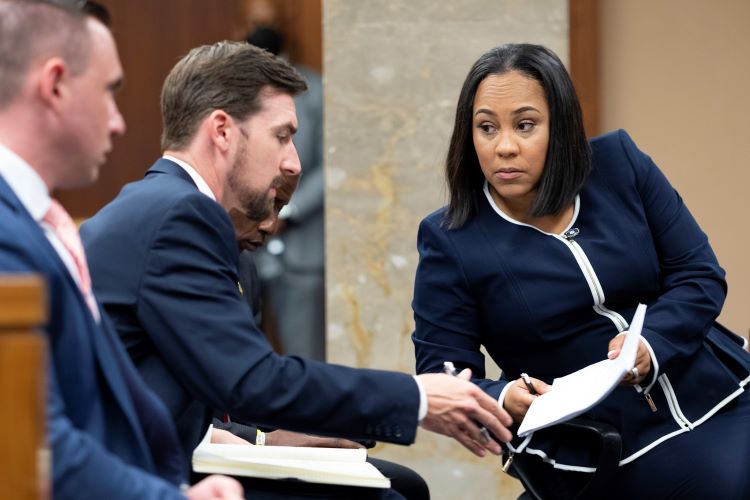Meet Fani Willis, the Georgia prosecutor investigating Trump and his allies

Fulton County District Attorney Fani Willis talks with a member of her team during proceedings to seat a special grand jury in Fulton County, Georgia, in May 2022 to look into the actions of former President Donald Trump and his supporters who tried to overturn the results of the 2020 election. The hearing took place in Atlanta. Photo by Ben Gray/The Associated Press.
The Georgia prosecutor who will make the decision on whether to seek charges against former President Donald Trump or his allies is 51-year-old Fulton County District Attorney Fani T. Willis, a former homicide prosecutor who now has a penchant for using the state’s broad racketeering law.
A special grand jury has wrapped up its work after investigating whether Trump or others violated Georgia law by seeking to overturn the 2020 presidential election, according to the New York Times and Politico. A Jan. 24 hearing will decide whether the findings should be made public.
The special grand jury is expected to make a charging recommendation, but it will be up to Willis whether to take the case to a regular grand jury for an indictment, according to the Associated Press.
CNN, the Washington Post, the New York Times and South Atlanta Magazine have published profiles on Willis.
Willis is a 1996 graduate of the Emory University School of Law who previously worked as an assistant district attorney in Fulton County, Georgia, and a lawyer in private practice.
Vince Velazquez had worked with Willis as a homicide detective in Atlanta.
“She is a pit bull,” Velazquez told the Washington Post. “If I committed a crime, I would not want to be prosecuted by Fani Willis.”
Willis, a Democrat, called dozens of witnesses to testify before the special grand jury, including Trump lawyers Rudy Giuliani and John Eastman, Republican U.S. Sen. Lindsey Graham of South Carolina and Trump’s former chief of staff Mark Meadows. The panel likely examined efforts to install fake electors and Trump’s phone call urging Georgia Secretary of State Brad Raffensperger to find enough votes to reverse the election results.
Some of the election witnesses had claimed political bias by Willis and asked the judge to disqualify her. The judge refused, except in the case of fake Trump elector Burt Jones, who was previously a Georgia state senator. The judge disqualified Willis because she had hosted a fundraiser for Jones’ opponent for lieutenant governor—an act that he called a “‘What are you thinking?’ moment.”
Willis has said the racketeering law could apply to any election crimes, as could laws banning criminal solicitation to commit election fraud, making false statements, conspiracy and threatening election officials, according to the Washington Post.
Georgia’s racketeering law is broader than its federal counterpart. Its use has “exploded” since Willis took office, according to the Washington Post. The law “allows you to tell jurors the full story,” Willis told the newspaper.
Willis has said she was raised by a single father, John Floyd, who was a criminal defense lawyer and a member of the Black Panther Party. Her first name means “prosperous” in Swahili, and her middle name, Taifa, means “people,” according to South Atlanta Magazine. She is the first Black lawyer to be elected as the district attorney in Fulton County, Georgia.
While an assistant district attorney for nearly two decades, Willis “handled hundreds of murder cases and was known for her ability to establish a rapport with jurors and witnesses while responding harshly to those she saw as impeding a case,” according to the Washington Post. “She rehearsed her arguments incessantly, colleagues recall, and had a flair for the dramatic.”
In one case, Willis showed jurors “an odorous bucket of bleach” to remind them that a defendant had tried to clean up blood evidence, according to the Washington Post.
Willis and other prosecutors used the Georgia racketeering law against Atlanta educators in a test-cheating scandal.
Willis and other prosecutors obtained convictions in 2015 against 11 defendants who were charged for trying to raise test scores to protect their jobs and earn bonuses. Twenty-one educators pleaded guilty. Critics noticed that many of the defendants were Black and deemed Willis to be a sellout.
After she won her election and became the district attorney in January 2021, Willis created a pre-indictment diversion program that enrolls defendants in life skills courses and community service. She sought and received additional funds to hire staff members to deal with a backlog of cases that accumulated during the COVID-19 pandemic.
She has also brought racketeering charges against Atlanta rappers, such as Young Thug and Gunna and members of the Drug Rich street gang. In some of the cases, Willis has cited rap lyrics as evidence, a controversial tactic. Willis said at an August press conference rappers shouldn’t be allowed to commit crimes “and then decide to brag on it” as a form of intimidation, according to CNN.
According to the New York Times, after Willis became the district attorney, she had this Malcolm X quote painted on the wall: “I’m for truth, no matter who tells it. I’m for justice, no matter who it is for or against.”
Willis told the Washington Post that government in a democracy has two responsibilities.
“The No. 1 thing that needs to happen in a free society is that you’ve got to keep people safe,” she said. “The second thing in a free country is the importance of the right to vote.”
Write a letter to the editor, share a story tip or update, or report an error.


